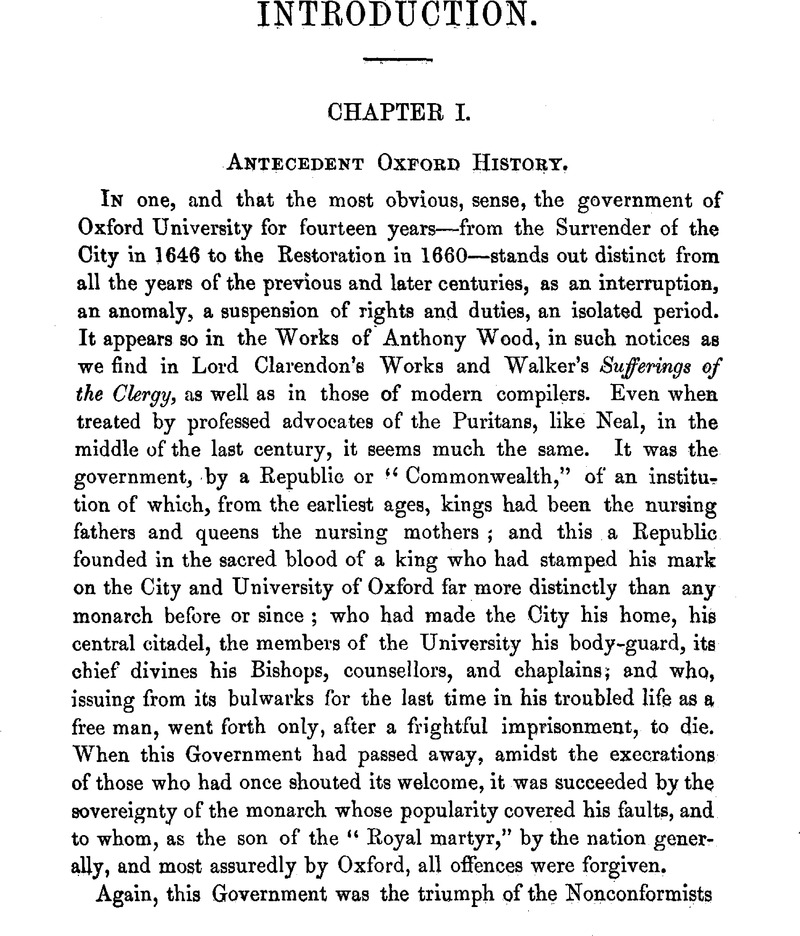No CrossRef data available.
Article contents
Chapter I. Antecedent Oxford History
Published online by Cambridge University Press: 04 January 2010
Abstract

- Type
- Introduction
- Information
- Camden New Series , Volume 29: The Register of the Visitors of The University of Oxford from A.D. 1647 to A.D. 1658 , December 1881 , pp. xi - xxx
- Copyright
- Copyright © Royal Historical Society 1881
References
page xii note a They were not so much Dissenters from its constitution as Nonconformists to some of its requisitions.”—Orme's Memoirs of Dr. John Owen, p. 5.Google Scholar
page xix note a Life of Bishop Bull, Works, vol. vii. p. 11Google Scholar. Prideaux' Euchologia or Practical Praying; a Legacy left to his daughters; Private; was repnblished in 1841 by Dr. S. W. Cornish (Parker), and seems well deserving of the praises of the Editor.
page xix note b Perry, 's History of the Church of England, vol. i. pp. 19, 84Google Scholar. Worthies of All Souls, pp. 120–122.Google Scholar
page xxi note a See Clarendon, 's History of the Great Rebellion, book i. pp. 163–172Google Scholar: Oxford Edition.
page xxi note b The importance of Prideaux' ecclesiastical position may justify a quotation. On the last occasion above mentioned, when he defended himself, with success, from the malicious charges brought against him before Laud and the King, he makes the following confession of Faith, or “Protestation”:—
“That as I believe the Catholic Church in my creed, so I reverence this Church of England, wherein I have had my baptism and whole breeding, as a most eminent member of it. To the doctrine and discipline of this Church have I hitherto often subscribed, and by God's grace constantly adhered; and resolve by the same assistance according to my ability (under his Majesty's protection) faithfully to maintain against Papists, Puritans, or any other that shall oppose it. The prelacy of our revered bishops in it I have ever defended in my place to be jure divino, which I dare say has been more often, and with greater painstaking, than most of those have done who have received greater encouragement from their lordships. I desire nothing but the continuance of my vocation in a peaceable course, that, after all my pains in the place of his Majesty's Professor almost for these eighteen years together, my sons especially be not countenanced in my declining age to vilify and vex me. So shall I spend the remainder of my time in hearty prayer for his Majesty, my only master and patron, for the reverend Bishops, the State, and all his Majesty's subjects and affairs, and continue my utmost endeavours to do all faithful service to the Church wherein I live. To whose authority I ever have, and do hereby submit myself and studies to be according to God's word directed or corrected.
page xxvii note a See Parr, 's Life of Ussher, App. p. 7Google Scholar; Elrington, 's Life of Ussher, vol. i. pp. 209, 256, 257Google Scholar. For Lord Falkland's position on this subject, see a Paper in the Church Quarterly for July 1877, entitled “Lord Falkland and his Modern Critics,” by the writer of these pages.
page xxvii note b For Mountagu's position see “Parliament and the Church of England.” (Seeley.) 1875.
page xxviii note a Some doubt hangs over the exact nature of what is called “Ussher's Model”; but what Ussher proposed or sanctioned in 1641, what he proposed in 1648 at Newport (and which was accepted by Charles I. and the Presbyterian ministers), and what formed the basis of discussion at the Savoy Conference in 1661, was substantially the same thing; the Bishop was only to act, in Ordination and Jurisdiction, in concurrence with other clergy, whether Suffragan Bishops or representative Presbyters, and in connection with Synods meeting periodically.


